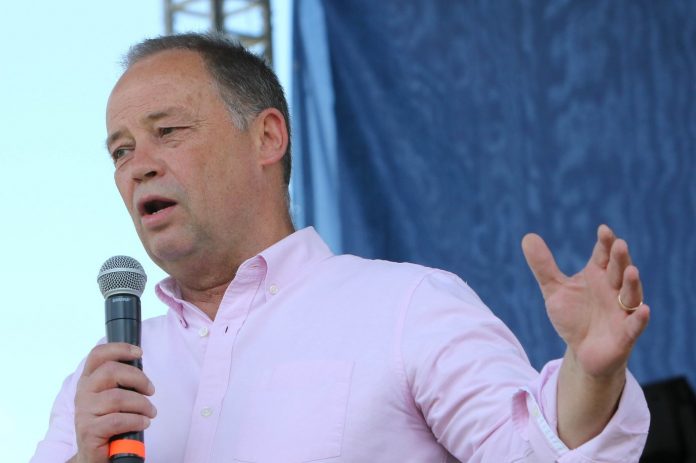As Hungarians prepare to go to the polls on April 8 – in an election that is expected to see Prime Minister Viktor Orban win a third consecutive term in office, one Hungarian MEP has issued a statement about the European Union.
Let’s talk about Europe too! This is the title of MEP Tibor Szanyi’s press release. A member of the Progressive Alliance of Socialists and Democrats (S&D) Group in the European Parliament, he writes: “To summarise, the EU is nothing more than the common will of its member states. Where the joint will is strong, the EU is successful, however, where there is a lack of member states’ joint will the EU is weak. Nevertheless, it can be said that the EU as an institution – by virtue of its being – cannot be the enemy of any of it member states. However, it is quite possible conversely, that is any member states can block the common will and unfortunately Hungary [along with Poland] is currently ‘leading’ in this role.”
According to Szanyi, “misleading facts” about European Union policies have been injected into the election campaign. “I think it is important to talk about the truth as well,” he writes.
First on the MEP’s list is Brexit. According to Szanyi, a “big question” is about the future mobility of EU and British citizens. “No drastic changes will be expected in case of new Hungarian workers (and other EU and British workers) either, although stricter administrative regulation is expected.”
As for migration, Szanyi stresses that there is no binding refugee settlement quota on the EU’s agenda. “Back in 2015 – also supported by Viktor Orban! – member states’ leaders agreed with a one-off decision to allocate 120,000 (+40,000) asylum applications among each other, but because of the failure of this plan, the quota issue was removed from the agenda. There is talk, however, about the setting up of a voluntary mechanism, but this is only part of the slowly formulating Dublin asylum system reform. Nevertheless, the strengthening of common border protection is moving forward with great progress, and as a result the internal migration tensions were significantly reduced.”
The MEP was also quick to note that the Hungarian government did fulfil its transitional quota in 2015 (instead of evaluating 1,300 requests it took in 3,000 refugees).
As regards the EU’s Cohesion policy, Szanyi tried to put to rest a common misconception in his country. “Contrary to the Hungarian belief, EU institutions do not support any link between handling migration and disbursing EU development funds,” he said. “The mission of the Cohesion Fund is to offset some of the differences between the developed and the less developed Member States, which are mainly due to different capabilities to succeed on the single internal market.”
On the euro, Szanyi noted that the wider adoption of the bloc’s single currency was given new impetus within the EU’s economic policy priorities.
“One of the reasons for this is that the euro area has been more successful than the outsiders. In our region the development of Slovakia is stronger than the others, while Hungary has became the tail ender,” he explained. “After the expected Brexit, only one country (Denmark) will have derogation, although the Danish crown is heavily tied to the euro. The remaining 7 member states, including Hungary, that are struggling with the conditions for the introduction, can take advantage of the wide-ranging assistance offered by the euro zone.”
On the issue of taxation, Szanyi said the European Parliament has taken a number of initiatives as a direct consequence of the recent tax evasion scandals, while the European Commission has also imposed a set of fines, mainly on global companies. “The main ambitions now are the creation of a unified European income tax base, the clarification of the concept of tax havens and the inclusion of the list of countries belonging to the latter,” he said. “It is also a new principle that everyone must pay where their profits arise. In order to ensure the stability of the EU budget, it is on the agenda to create own revenues through EU-wide exposed taxes. One obvious tool for this could be a financial transaction tax on large money movements. In order to better control cross-border VAT movements, the finalization of the rules of the European VAT system is expected to take place imminently.”
According to Szanyi, the Hungarian government is the most hostile towards the legal harmonisation effort. The reason for this, he argued, is not to protect the interests of citizens or SMEs, but the privileges of the oligarchs and multinational companies.
Looking at the EU’s budget planning period, starting January 2021, Szanyi noted that it reflects the opinion of the member states, putting emphasis on border security, military defence, climate protection, social market economy, youth mobility, digital transformation, research and innovation, monetary union, cohesion policy, common agricultural policy, investment outside the EU. “It is clear that the number one priority does not aim at any mass migration, but rather to achieve the opposite,” he said.
On the issue of Russia, Szanyi warned that the EU’s stance (flagging Russia as an aggressor and imposing sanctions) exposes the bloc to a potential military threat. “The EU has become very united in tackling harmful Russian policies, although three member states (Hungary, Italy, Greece) have adopted a more tolerant position. Nevertheless, the EU’s foreign policy unity is sound, while its success is, for the time being, highly doubtful due to its maverick members.”
In closing the MEP stressed “mutual solidarity” as the “essence and fuel” of the EU. “The success of the renewed European integration also includes the promise of the resurgence of the European Left,” he wrote.

